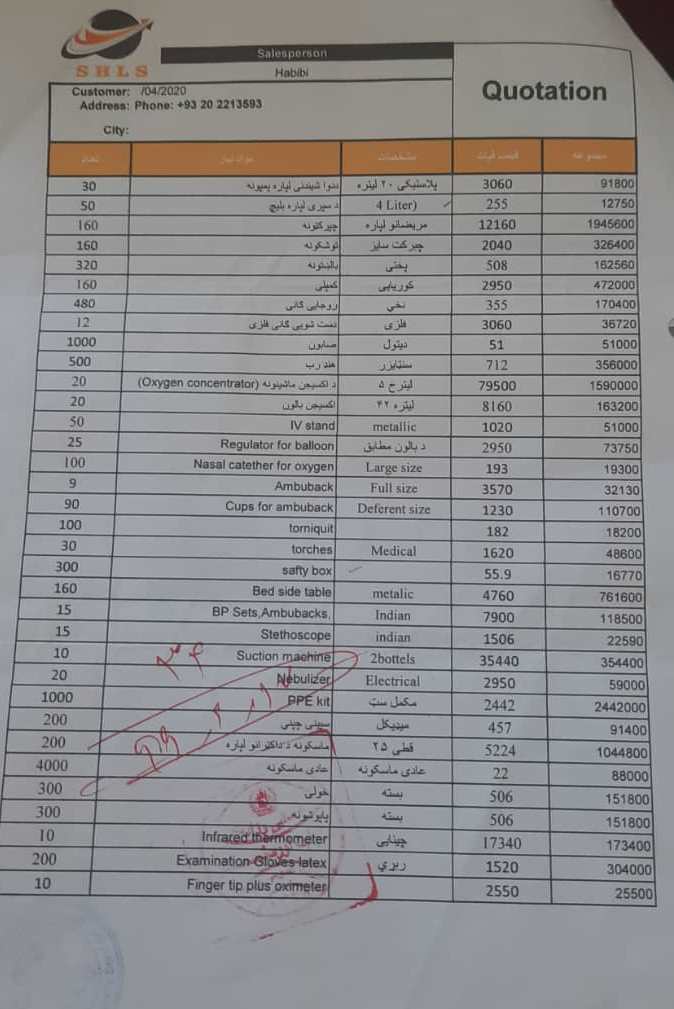PARON (Pajhwok): During the first wave of coronavirus, N95 masks were purchased for the Kamdesh District Hospital in eastern Nuristan province at a very higher rate compared to their market price, Pajhwok Afghan News reliably learned on Monday.
One N95 mask normal market price hovers between 200 afghanis and 300 afs while one similar mask was purchased for Kamdesh District Hospital at the exorbitant rate of 5,224 afghanis.
Pajhwok Afghan News investigation shows millions of afghani had been embezzled in the coronavirus and solar projects funds.
On the other hand, majority of coronavirus patients in Nuristan had received treatment in neighboring Nangarhar province while some coronavirus treatment related equipment were already existed in Nuristan hospitals.
On the other hand, Nuristan Governor Hafiz Abdul Qayyum rejected the statements as groundless. He scorned such documents as fake.
The governor explained the documents he had showed one package containing 25 masks cost 5,224 afghanis.
“Our document, which is verified by the revenue department and other organs, shows one mask was bought for 208 afghanis at a time when a single-sheet mask sold for 300 afghanis,” he added.
Qayyum insisted he was decisively combating corruption. However, he asked media outlets not to release reports without evidence or news that could damage someone’s reputation.
In Nuristan so far 952 people have been tested for coronavirus and among them 182 have tested positive while 40 people received their treatment in Nangarhar.
Nuristan Governor Hafiz Abdul Qayoum and some other officials had been referred to the Attorney General Office (AGO) over corruption charges in coronavirus fund but after investigation they were found innocent and were released.
In addition, 265 million afs were given to Nuristan province for installion of solar power systems in hospitals in districts, but there is a huge contrast in the items purchased and their prices in the market.
Covid-19 fund for Nuristan:
Nuristan province was provided 20 million afs fund to coupe with coronavirus. Thirteen millions of this fund has been spend while the remaining was returned to the centre.
Acting Public Affairs Director Mohammad Asif Buzarg said they purchased coronavirus related equipment for three provincial health centres.
Funds were in the hand of the Governor Office and they tasked a delegation which purchased the required equipment.
But documents available with Pajhwok Afghan News show this equipment had been purchased at a very high price.
The Kamdesh Central Clinic purchased medical equipment worth 21,094 afs from the coronavirus fund.
Some of these items included oxygen machine which was purchased at 79,500 afs but its market price is 40,000 to 60,000 afs. One oxygen regulator was purchased against 2,950 afs but its market price is from 1,000 to 15,000 afs.
In addition one heater that costs 6,000 afs in the market was purchased at the cost of 30,000 afs and one plastic basin consumed 4,990 afs.
Documents also show that one kilogram of clorin was purchased at 1,020 afs compared to its market price of 110 afs, while one washing machine price in the market is nearly 4,000 afs but it was bought at 19,000afs.
One N95 mask which is sold at bazaar for 200 to 300 afs was purchased for Kamdesh Central Hospital against 5,200 afs while a common mask was purchased for 22 afs instead of two afs.
The BP Set was purchased for Kamdesh Hospital at 7,700 afs against its market price of 700 afs.
One nebulizer is available in the market against 1,400 afs but it was purchased at a two time higher rate of 2,950 afs.
Medical equipment for two other Nuristan health centres have been purchased at the same higher rates.
Provincial Council Head Saeedullah Penda confirmed medical equipment had been purchased at higher rate for Nuristan hospitals.
Why goods purchased at higher prices?
Nuristan public health department and local officials said that remoteness of the province’s districts was the reason the prices of goods were higher as the transfer of products cost more than in other areas.
The documents of the goods also state that the reason of high prices was the remoteness of districts where the goods transferred.
However, provincial council says that the distance of districts was not that much long to increase the price of a 500 afghanis worth bucket to 5,000 afghanis.
Sayedullah Paindazoi said that the transfer of goods to the mentioned districts did not cost hundreds and thousands of Afghanis.
“These three centers including one in Paron and another in Nurgram, if a person starts journey from Mehtarlam, capital of Laghman, he would reach in half an hour and the fare of one person is 100 afghanis. Kamdesh is very close and reachable in two kilometers after passing Kunar area, it is impossible that the transfer would cost that much,” he said.
On the other hand, there is no any medicine to cure Covid-19 in any of Nuristsan hospitals and many healthcare centers had been shut due to delay of salaries to health professionals in the province.
On the other hand, the governor of Nuristan, Hafiz Abdul Qayum denied these statements and said that the documents were fake.
documents were fake.
He said that his documents show one package that contains 25 masks cost 5,224 Afghanis.
“Our document which is verified by the revenue department and other organs show that one mask was bought for 208 Afghanis in a time when a single mask was sold for 300 Afghanis,” he said.
Abdul Qayum said that he was decisively fighting against corruption but stressed that media should not publish reports that lack evidences and could damage personality of someone.
The Office of Ombudsperson’s decision regarding corruption in Covid-19 response fund:
The Office of Ombudsperson has referred current Kunar governor, Hafiz Abdul Qayum and a number of local officails to the attorney office over corruption in Covid-19 response fund.
However, the Attorney General Office (AGO) said that the case had been suspended due to lack of required evidences.
AGO spokesman, Jamshid Rasouli said, “After comprehensive investigations, the case has been suspended due to lack of required evidences.”
Some other documents show that solar based electricity project in Kunar is implemented on higher prices.
Besides Covid-19 fund, installation of solar electricity networks and repairing healthcare centers are other areas where goods are purchased on higher rates.
Documents obtained by Pajhwok show that 256 million afghanis had been spent on repairing parts of 16 healthcare centers, installation of solar electricity system and purchasing some goods.
Based on the documents, announcement of these projects, purchasing goods, repairing and installations were done in three days and the money for the projects was withdrawn from the revenue office.
A document from Nuristan revenue department shows that 9.87 million Afghanis had been transferred to Iqba Tariq Construction Company for solar lighting installation in a clinic in Atayee village in Bargamtal district in 2020.
However, Pajhwok findings show that providing a solar system for a village clinic does not cost that much money.
A letter from Nuristan Police Headquarters obtained by Pajhwok show that the proivncila police chief had ordered district police chiefs to check local clinics whether they are installed with the solar system or not.
The letter also said that medicines and equipment which purchased for 265 million afghanis should be also clarified.
It said that the equipment and goods contracted on December 26, 2020 but the money was provided to contracted companies six months ahead.
The Police Headquarters on April 28 gave 24 hours deadline to district police chiefs to investigate the issue, but the provincial police spokesman, Sarajulhaq Amiri said that no action was so far taken on the regard.
Nh/mds/ma







GET IN TOUCH
NEWSLETTER
SUGGEST A STORY
PAJHWOK MOBILE APP